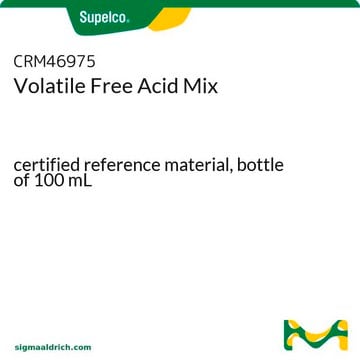W285811
2-Phényléthanol
natural, ≥99%, FCC, FG
Synonyme(s) :
β-PEA, Alcool 2-phényléthylique, Benzyl carbinol, PEA
About This Item
Halal
Kosher
natural
Produits recommandés
Qualité
FG
Halal
Kosher
natural
Niveau de qualité
Agence
meets purity specifications of JECFA
Conformité réglementaire
EU Regulation 1334/2008 & 178/2002
FCC
FDA 21 CFR 172.515
Densité de vapeur
4.21 (vs air)
Pression de vapeur
1 mmHg ( 58 °C)
Essai
≥99%
Caractéristiques du produit alternatif plus écologique
Less Hazardous Chemical Syntheses
Use of Renewable Feedstocks
Learn more about the Principles of Green Chemistry.
Indice de réfraction
n20/D 1.5317 (lit.)
pb
219-221 °C/750 mmHg (lit.)
Pf
−27 °C (lit.)
Densité
1.020 g/mL at 20 °C (lit.)
Application(s)
flavors and fragrances
Documentation
see Safety & Documentation for available documents
Allergène alimentaire
no known allergens
Autre catégorie plus écologique
Propriétés organoleptiques
honey; floral; rose
Chaîne SMILES
OCCc1ccccc1
InChI
1S/C8H10O/c9-7-6-8-4-2-1-3-5-8/h1-5,9H,6-7H2
Clé InChI
WRMNZCZEMHIOCP-UHFFFAOYSA-N
Vous recherchez des produits similaires ? Visite Guide de comparaison des produits
Catégories apparentées
Description générale
En option
Mention d'avertissement
Warning
Mentions de danger
Conseils de prudence
Classification des risques
Acute Tox. 4 Oral - Eye Irrit. 2
Code de la classe de stockage
10 - Combustible liquids
Classe de danger pour l'eau (WGK)
WGK 1
Point d'éclair (°F)
215.6 °F - closed cup
Point d'éclair (°C)
102 °C - closed cup
Équipement de protection individuelle
Eyeshields, Faceshields, Gloves, type ABEK (EN14387) respirator filter
Faites votre choix parmi les versions les plus récentes :
Déjà en possession de ce produit ?
Retrouvez la documentation relative aux produits que vous avez récemment achetés dans la Bibliothèque de documents.
Les clients ont également consulté
Notre équipe de scientifiques dispose d'une expérience dans tous les secteurs de la recherche, notamment en sciences de la vie, science des matériaux, synthèse chimique, chromatographie, analyse et dans de nombreux autres domaines..
Contacter notre Service technique









![5H-5-Methyl-6,7-dihydrocyclopenta[b]pyrazine ≥97%, FG](/deepweb/assets/sigmaaldrich/product/structures/977/118/0f103486-e428-4abd-a429-3075804ae8e8/640/0f103486-e428-4abd-a429-3075804ae8e8.png)



